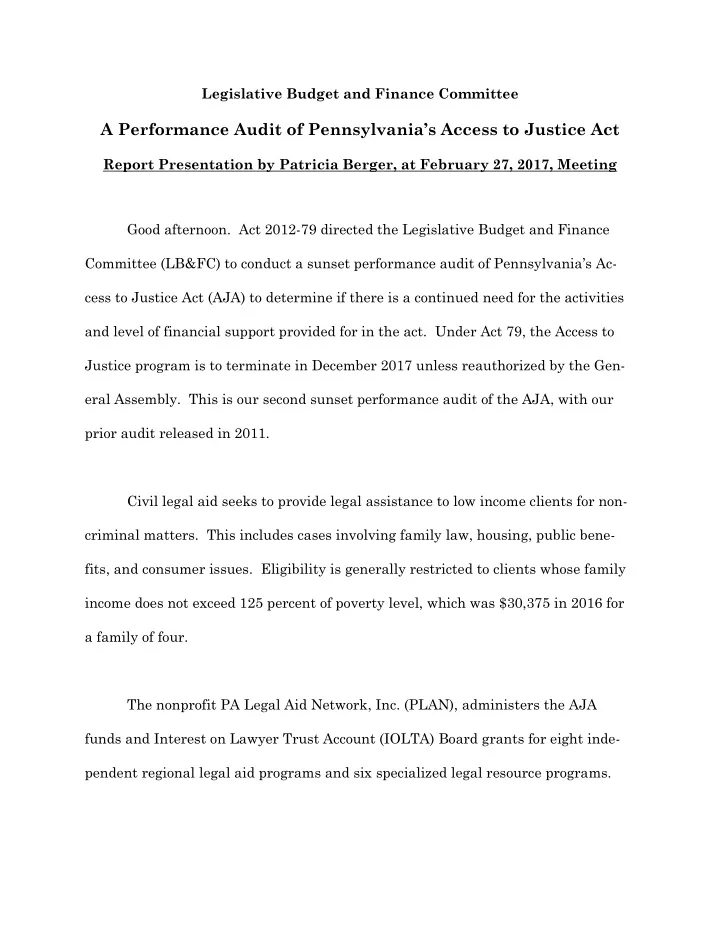

Legislative Budget and Finance Committee A Performance Audit of Pennsylvania’s Access to Justice Act Report Presentation by Patricia Berger, at February 27, 2017, Meeting Good afternoon. Act 2012-79 directed the Legislative Budget and Finance Committee (LB&FC) to conduct a sunset performance audit of Pennsylvania’s Ac- cess to Justice Act (AJA) to determine if there is a continued need for the activities and level of financial support provided for in the act. Under Act 79, the Access to Justice program is to terminate in December 2017 unless reauthorized by the Gen- eral Assembly. This is our second sunset performance audit of the AJA, with our prior audit released in 2011. Civil legal aid seeks to provide legal assistance to low income clients for non- criminal matters. This includes cases involving family law, housing, public bene- fits, and consumer issues. Eligibility is generally restricted to clients whose family income does not exceed 125 percent of poverty level, which was $30,375 in 2016 for a family of four. The nonprofit PA Legal Aid Network, Inc. (PLAN), administers the AJA funds and Interest on Lawyer Trust Account (IOLTA) Board grants for eight inde- pendent regional legal aid programs and six specialized legal resource programs.
These programs, and one non-PLAN funded program, comprise the PA Legal Aid Network. Services are available throughout the state. Funding for civil legal aid in Pennsylvania, like in other states, is derived from many sources, including federal funding from the Legal Services Corporation (LSC), Title XX funds, AJA funds, IOLTA funds, and private funds. We found total funding for Pennsylvania Legal Aid Network (PLAN) civil legal aid in Pennsylvania was $45.8 million in FY 2014-15, with the AJA funds accounting for approximately 23 percent ($10.6 million) of that total. Other state funding sources include IOLTA funds, which are derived from the interest earned on certain lawyer trust accounts, and MJ-IOTA funds, which come from interest earned on monies held for a short period of time by the minor judici- ary. The revenue from these funds has averaged about $1.8 million annually, down from a high of $9.2 million in FY 2007-08 due to the drop in interest rates. Tempo- rary funding has also been provided through the Homeowner Assistance Settlement Act (HASA) that has provided an additional $900,000 in FY 2012-13 and $600,000 for the past three fiscal years. HASA funding, however, ends at the end of this fis- cal year (FY 2016-17). In addition to state sources, civil legal aid also receives significant federal funding from Legal Services Corporation, which amounted to $11.4 million in FY 2
2014-15. Federal funding has declined 16 percent since 2010, and funding from all sources has declined by about 6 percent over this same time period. As a result, to- tal funding for civil legal aid from both state and federal sources has declined from $48.6 million in FY 2010-11 to $45.9 million in FY 2014-15. With regard to program performance, we found the Commonwealth’s legal aid programs handled approximately 70,000 cases in FY 2014-15. Of these, about 17,000 are funded using AJA funds, primarily for family law and housing issues. This is a decrease of 34 percent in overall cases handled and a 25 percent decrease in the number of cases handled using AJA funds since FY 2010-11. As we found in our 2011 audit, approximately one eligible applicant is turned away for every appli- cant receiving services. For cases where the resolution is known, about 87 percent of AJA-funded cases were successfully resolved in FY 2014-15. However, outcome information was not available for the 60 percent of clients who received telephone or limited service advice, generally on how to follow through on the matter on their own. Total direct financial benefits to legal aid clients as a result of the services they received were estimated at $14 million in FY 2014-15. The LSP providers receive periodic monitoring visits from PLAN administra- tors to assess their performance. We reviewed these and other audit and monitoring 3
reports, as well as conducted interviews with various officials knowledgeable about the operations of the LSP operations. In general, we found no significant ongoing concerns with program administration. In summary, the services provided by the Access to Justice program continue to be important to low-income residents, and the program appears to be well- monitored. The major problem facing the program continues to be funding. Due to the continued need for civil legal aid for the foreseeable future and due to the relatively tight financial and performance monitoring requirements im- posed on the legal aid providers, we recommend that the General Assembly consider not including a sunset provision in a future AJA reauthorizing act. Of course, the General Assembly could still direct the LB&FC to conduct a performance audit of the program, but it would be on an as-needed basis rather than scheduled in law. In closing, we acknowledge and thank the IOLTA Board and its staff for their excellent cooperation and assistance during this study. We also thank PLAN and its staff who assisted us in our work. Thank you. 4
Recommend
More recommend